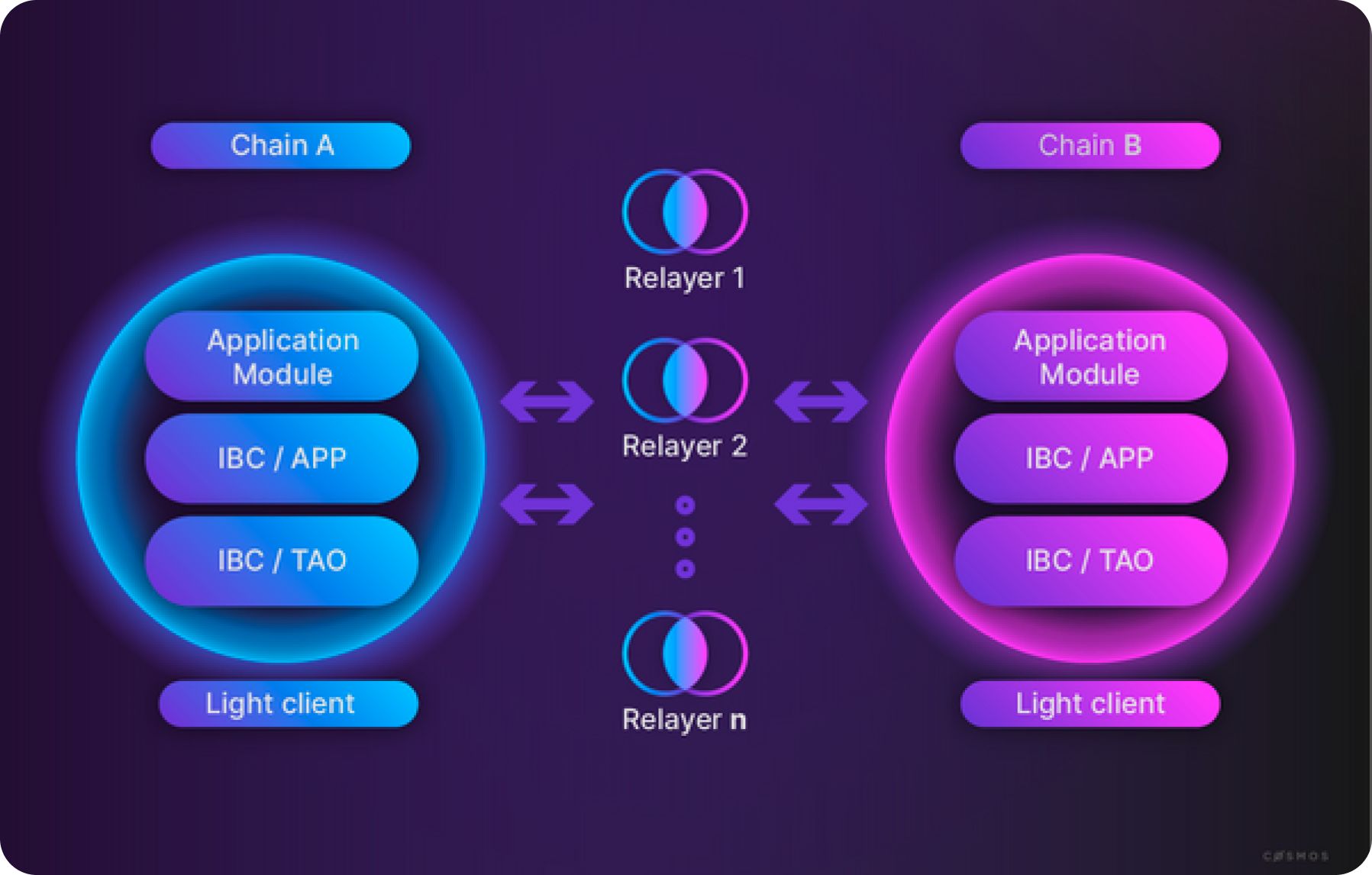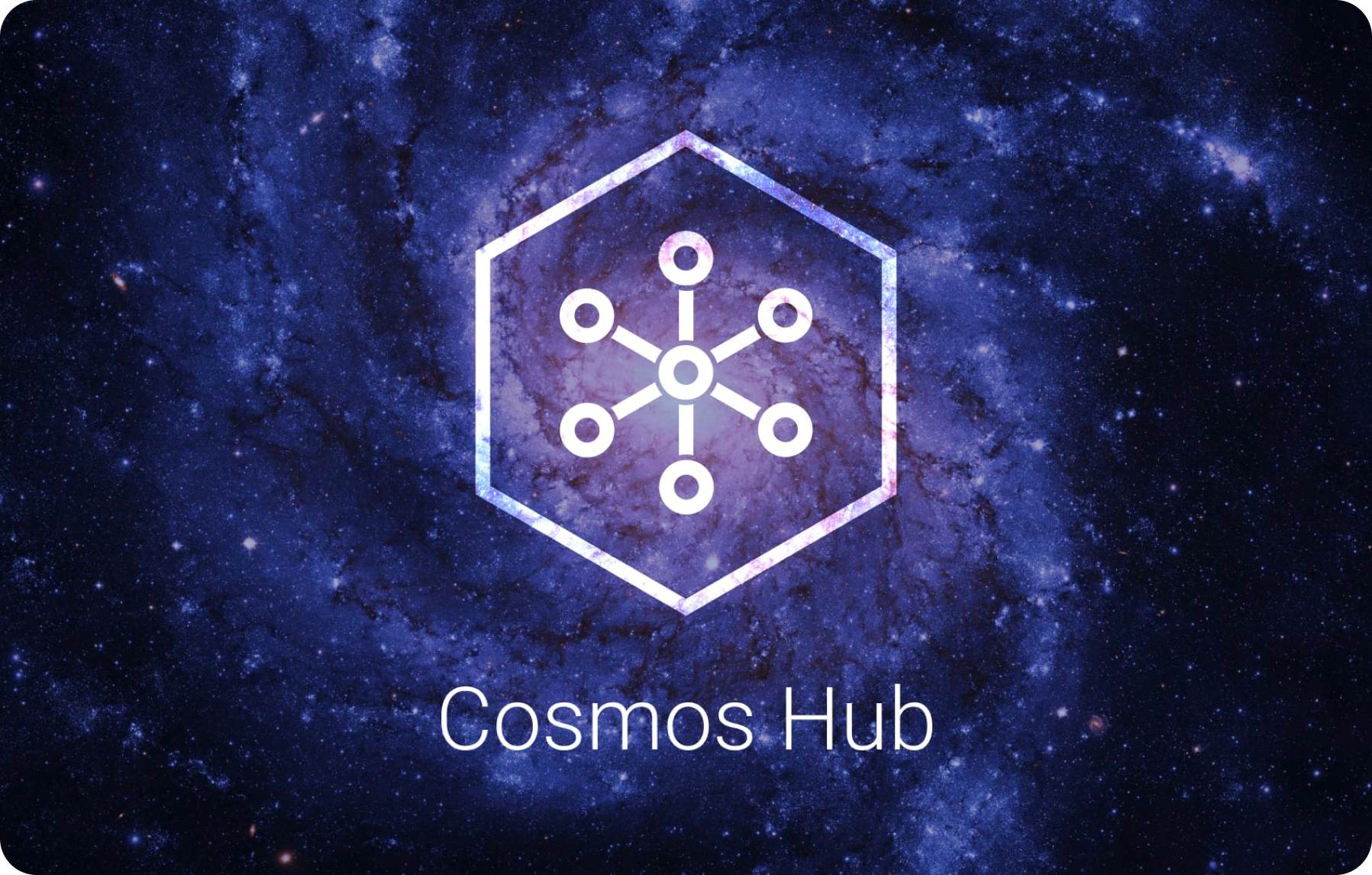Cosmos Blockchain Ecosystem Review
Key Insights
- A deep look into underlying technical software and key elements of Cosmos ecosystem.
- Detailed economic model of Cosmos Blockchain including Proof-of-Stake (PoS), staking, and ATOM (Cosmos cryptocurrency).
- For better understanding we provide examples of Cosmos usage, partnerships, and collaborations.
What Is Cosmos
The project was introduced in 2014 by developers Jae Kwon and Ethan Buchman and then founded in 2017. Cosmos' history is inextricably linked to the growing interest in blockchain scalability and solving the problem of isolation between different blockchains.
The platform offers a solution for building scalable, secure and interoperable blockchains and decentralized applications.
Technical Сomponents of Cosmos
Tendermint Core
Tendermint Core is software designed to provide consensus in the blockchain. It is used in the Cosmos project and is a key component of many blockchains built on the platform.
The main features of Tendermint Core are its ease of use and high performance. It provides consensus by voting among the nodes in the network using the Byzantine Fault Tolerance (BFT) algorithm.

This means that the nodes in the network agree on which transactions will be included in a block and what block order will be respected.
One of the advantages of Tendermint Core is its ability to handle high network loads while providing high performance and transaction confirmation rates. This makes it a suitable choice for creating scalable blockchains that can be used in a variety of applications, including financial services, decentralized applications, and others.
Tendermint Core technology also ensures the reliability of the network by protecting it from various attacks and ensuring data integrity. This helps create trust in the blockchain and its applications, which is an important factor for widespread adoption of blockchain technology.
Cosmos Blockchain’s SDK
The Cosmos SDK (Software Development Kit) is a set of tools and libraries provided to developers to build their own blockchains on the Cosmos crypto platform. It provides flexibility and powerful tools for developing customized blockchains with unique functionality.
The core components of the Cosmos SDK include a modular architecture that allows developers to select and integrate only the modules they need into their blockchain to create a customizable feature set. The modularity of Cosmos SDKs makes blockchain development more flexible and efficient by allowing components to work together and interact with each other.
In addition, the Cosmos SDK provides tools for asset management, accounting for user balances, implementing smart contracts, and more. These tools allow developers to build a variety of blockchain-based applications, including decentralized financial applications (DeFi), digital markets, identity systems, and more.
Using the Cosmos SDK simplifies the process of building and running your own blockchain, making it accessible to a wide range of developers. This supports the growth of the Cosmos ecosystem, as new blockchains can be easily created and integrated into this interoperable environment.
Inter-Blockchain Communication Protocol (IBC)
The Inter-Blockchain Communication Protocol (IBC) is a key element of the Cosmos ecosystem designed to enable interoperability between different blockchains. IBC allows blockchains in the Cosmos network to exchange data and assets directly with each other, creating a connected network of blockchains.
The basic principle of IBC is to establish and maintain communication channels between different blockchains. Each channel represents a reliable and secure link between two blockchains through which they can transmit messages and transactions. This process relies on the use of cryptography and agreed protocols to ensure the security and integrity of the data being transmitted.

The IBC protocol provides flexible and extensible interoperability between blockchains, allowing developers to create different use cases, such as exchanging digital assets, executing cross-chain smart contracts, and implementing decentralized financial applications across multiple blockchains.
One of the main advantages of the IBC protocol is its ability to provide interoperability between blockchains, regardless of their specific implementation or technical characteristics. This makes IBC a powerful tool for creating interconnected blockchain networks and increasing the overall functionality and utility of the Cosmos ecosystem.
Cosmos Hub
Cosmos Hub is the main blockchain in the Cosmos ecosystem and plays a central role in enabling interoperability and connectivity between the different blockchains in the network. It is the hub for exchanging data, assets and messages between different blockchains, creating a unified environment for decentralized applications and services.

The primary function of Cosmos Hub is to provide secure and efficient routing of messages between different blockchains using the Inter-Blockchain Communication (IBC) protocol. This allows blockchains in the Cosmos network to interact with each other, exchange assets and perform cross-chain transactions.
In addition, Cosmos Hub performs a number of additional functions, including managing the network, setting voting rules and making decisions about the development of the ecosystem. It also issues and manages the internal cryptocurrency ATOM, which plays the role of an important asset in the Cosmos network.
Cosmos Hub serves as an important component in the Cosmos architecture, providing a centralized entry point for blockchains and a governance role in the exchange of data and value on the network. Its functionality and security play a key role in ensuring the efficient operation of the entire Cosmos ecosystem.
Cosmos Blockchain Economic model
Economic model of Cosmos project includes PoS, staking and its own ATOM cryptocurrency.
Proof-of-Stake and Staking
Proof-of-Stake (PoS) is a consensus mechanism used in blockchains where participants in the network can stake their coins (stakes) as a guarantee to ensure the security and consent of the network. In the Cosmos ecosystem, through PoS, participants can stake their ATOM crypto to participate in the voting process and earn rewards for supporting the network.
Staking is the process of participating in the blockchain by depositing their coins for a certain period of time. Participants who have staked their coins can earn rewards in the form of new coins for supporting the network and keeping it secure. As the amount of staking increases, participants have more chances to participate in voting and decision making on the network.
The Role of ATOM
ATOM is a cryptocurrency used in the Cosmos ecosystem. It is issued and managed by Cosmos Hub, the main blockchain in the network.
Users can get ATOM on SimpleSwap.
ATOM plays an important role in the Cosmos economic model, serving several functions:
- Payment of transaction fees
Network users can use ATOM to pay transaction fees on the Cosmos blockchain.
- Voting
ATOM holders have a voice in decision-making processes related to the development and management of the Cosmos network.
- Staking and earning rewards
ATOM holders can stake their coins to participate in the staking process and earn rewards in the form of new coins for supporting the network.
ATOM plays a key role in the security, stability, and management of the Cosmos network. Its use promotes the participation and ownership of participants in the development of the Cosmos ecosystem.
Cosmos Use Cases
DeFi on Cosmos
DeFi (Decentralized Finance) is an ecosystem of blockchain-based financial applications and services that are independent of centralized financial intermediaries. There are several examples of DeFi applications on the Cosmos platform:
- Osmosis
Based on Cosmos, Osmosis is a decentralized exchange that allows users to exchange various tokens and participate in liquidity and steaking.
- Akash Network
Akash Network provides decentralized hosting and cloud computing solutions based on Cosmos, allowing users to rent out their computing resources and be rewarded for their use.
Partnerships and collaborations
Within the Cosmos ecosystem, there has been an active development of partnerships and collaborations with other projects and companies.
Some of Cosmos' key partnerships include:
- Binance
One of the largest crypto exchanges in the world, supports the ATOM cryptocurrency and actively collaborates with Cosmos-based projects.
- Crypto.com
This is another major cryptocurrency platform that actively engages with the Cosmos ecosystem.
Summary
The Cosmos ecosystem represents an important and innovative project in the world of cryptocurrencies and blockchains. Based on the principles of interoperability and decentralization, Cosmos aims to create an open and flexible platform for the development and interoperability of different blockchains.
With key components such as Tendermint Core, Cosmos SDK and Inter-Blockchain Communication (IBC) protocol, Cosmos provides high performance, security and flexibility to develop scalable decentralized applications.
Cosmos' economic model, based on Proof-of-Stake and staking participation principles, and the role of the ATOM cryptocurrency, play a key role in ensuring the stability and development of the network.
Use cases such as DeFi applications on Cosmos, and partnerships with major players in the cryptocurrency industry, confirm the potential and relevance of the Cosmos ecosystem in the market.
Overall, Cosmos is a promising project that continues to attract the attention and interest of developers and users alike, and its further development may contribute to further progress in decentralized technologies.
Users can exchange all cryptocurrencies mentioned in this article for fiat or crypto on SimpleSwap.
The information in this article is not a piece of financial advice or any other advice of any kind. The reader should be aware of the risks involved in trading cryptocurrencies and make their own informed decisions. SimpleSwap is not responsible for any losses incurred due to such risks. For details, please see our Terms of Service.


